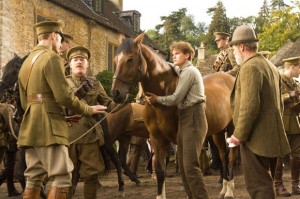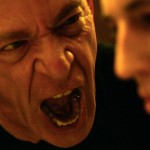 Steven Spielberg has proven he makes stirring movies about war, most notably “Saving Private Ryan.” In his old fashioned adaptation of the children’s book and Broadway play “War Horse,” he movingly uses a horse who repeatedly crosses battle lines as a way to make sense of a senseless war. However, the crux of the story rests on a remarkable relationship between a farm boy and the horse, one that never becomes entirely believable.
Steven Spielberg has proven he makes stirring movies about war, most notably “Saving Private Ryan.” In his old fashioned adaptation of the children’s book and Broadway play “War Horse,” he movingly uses a horse who repeatedly crosses battle lines as a way to make sense of a senseless war. However, the crux of the story rests on a remarkable relationship between a farm boy and the horse, one that never becomes entirely believable.
Joey the horse comes to the English farm of Albert (Jeremy Irvine) and his parents through an ill-advised bid at auction. Although noble and beautiful, Joey is worthless for farming. Albert, however, believes in him and they forge a bond in the turnip field that will last through the trenches of France. As the drums of war begin to beat, Albert’s mercurial father sells Joey to an English Calvary officer. The devastated Albert bids his friend goodbye, but promises to find him.
Joey’s journey through trenches, mud, calvary charges, deserter ranks, civilian homes, and the artillery corps create sequential vignettes of the war. Spielberg is particularly good at showing the pathos of war and he is never better than here while, keeping it strictly PG-13. When a calvary charge ends in disaster, the camera merely shows riderless horses leaping over machine guns, a poignant shot of loss and senseless death. Another fine moment happens when battleweary soldiers in trenches warily watch as mortars soar and explode all around, their nighttime faces lit up by the blasts, one after another.
Albert, who joins the war after Joey, and his horse both make splendid charges, which Spielberg captures in all their horrific glory.
Joey meets up with a French grandfather who frantically watches over his ailing granddaughter as bombs sound in the distance and swarms of soldiers take their food. He escapes with a German boy who aims to keep his promise to his mother to protect his too-young brother. He is tended by a German horse lover who, like all good people in war, finds himself doing things he never thought he would do.
These portraits of a country torn by conflict are powerful.
Less convincing, however, is the relationship that is supposed to be the heart of the story. Spielberg spends far too long in the beginning setting up the friendship, culminating in the plowing of a field of turnips. By the end, you feel as if you plowed the field yourself, it takes so long. The movie clocks in at two hours twenty minutes, which is a bottom-numbing amount of time.
There was a time when animal-boy friendships to this degree felt more natural. Lassie, of course, and Old Yeller. Black Beauty and the Black Stallion. In our urban, suburban, post-agrarian world, however, it’s hard to fathom that a young man would feel so strongly about a horse. We love our dogs, of course, but I doubt we’d search for them throughout a war over several years. The central passion for this particular horse, which is shared by other brief owners of the horse, feels overdone.
He must be some horse.
At some point, I stopped caring whether the boy and horse reunited. Nothing about the friendship connected with me.
As a symbol and a way to view the war, the Joey the horse is very powerful. As a central character, he’s just…well…a horse.












